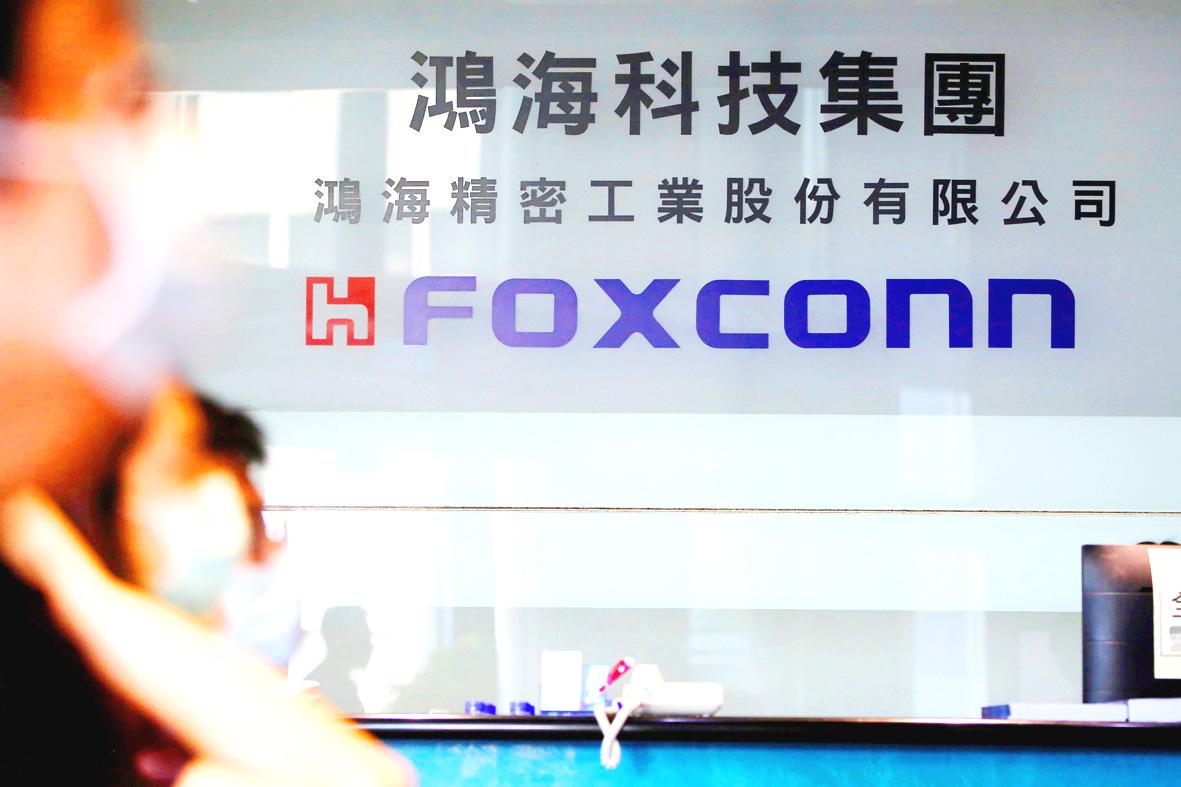India’s additional scrutiny of imports from China has disrupted operations at plants owned by Apple Inc supplier Foxconn Technology Group (富士康) in southern India, three sources said, and other foreign firms are also facing delays as tensions between the two countries build.
Customs officers at Indian ports have held back shipments from China and sought additional clearances after deadly clashes with China last month at the disputed Himalayan border.
The checks have been imposed without any formal order.

Photo: Reuters
While several companies such as Apple and Dell Technologies Inc have been battling to free stuck shipments, for Taiwanese contract manufacturer Foxconn, known as Hon Hai Precision Industry Co (鴻海精密) in Taiwan, hundreds of employees at two of its plants in the south this week had no major work to do as shipments were delayed, sources said.
More than 150 Foxconn shipments — containing smartphone and electronic parts — were stuck at the port of Chennai, though some are being cleared slowly, the first source said.
The total number of parts in the shipments was not clear.
Foxconn’s two plants in Tamil Nadu and Andhra Pradesh states mainly assemble Apple and Xiaomi Corp (小米) smartphones in the country and employ thousands of workers, many of whom stay in company-provided accommodations.
“Foxconn was in a very bad state ... lots of workers stayed at the dormitory because there was no work,” the first source said.
Foxconn, Apple and Xiaomi did not respond to requests for comment.
The Indian Ministry of Finance also did not respond.
Two officials at the ministry, which oversees the customs department, said the inspection measures were temporary and would ease soon.
“We cannot keep checking 100 percent of shipments forever... Shipments of non-Chinese companies being impacted will be cleared on priority,” one official said.
While the exact effect of the disruptions is not immediately clear, the delays come when companies in India had already been battling disrupted supply chains due to COVID-19 shutdowns in the past few months. Business activity has only just begun to pick up.
Prominent US-India lobby groups and local industry bodies have urged the Indian government to intervene.
While some delayed Dell shipments have been cleared since last week, the company this week had about 130 shipments stuck at Indian ports, the second source said.
This included about six shipping containers with parts for servers and desktop computers, the person added.
Dell did not respond to a request for comment.
Separately, MG Motor, a unit of China’s SAIC Motor Corp (上海汽車), also has some shipments stuck at a port in southern India, a source close to the company said.
MG started selling vehicles in India last year and has committed US$650 million in investments.
“The whole [auto] industry will be impacted if components are stuck,” the source said.
MG Motor did not immediately respond to a request for comment.
The Chinese Ministry of Commerce yesterday said that it hoped India would immediately correct its discriminatory actions against Chinese companies, after India banned some Chinese mobile apps amid the border crisis.

AI SERVER DEMAND: ‘Overall industry demand continues to outpace supply and we are expanding capacity to meet it,’ the company’s chief executive officer said Hon Hai Precision Industry Co (鴻海精密) yesterday reported that net profit last quarter rose 27 percent from the same quarter last year on the back of demand for cloud services and high-performance computing products. Net profit surged to NT$44.36 billion (US$1.48 billion) from NT$35.04 billion a year earlier. On a quarterly basis, net profit grew 5 percent from NT$42.1 billion. Earnings per share expanded to NT$3.19 from NT$2.53 a year earlier and NT$3.03 in the first quarter. However, a sharp appreciation of the New Taiwan dollar since early May has weighed on the company’s performance, Hon Hai chief financial officer David Huang (黃德才)

The Taiwan Automation Intelligence and Robot Show, which is to be held from Wednesday to Saturday at the Taipei Nangang Exhibition Center, would showcase the latest in artificial intelligence (AI)-driven robotics and automation technologies, the organizer said yesterday. The event would highlight applications in smart manufacturing, as well as information and communications technology, the Taiwan Automation Intelligence and Robotics Association said. More than 1,000 companies are to display innovations in semiconductors, electromechanics, industrial automation and intelligent manufacturing, it said in a news release. Visitors can explore automated guided vehicles, 3D machine vision systems and AI-powered applications at the show, along

FORECAST: The greater computing power needed for emerging AI applications has driven higher demand for advanced semiconductors worldwide, TSMC said The government-supported Industrial Technology Research Institute (ITRI) has raised its forecast for this year’s growth in the output value of Taiwan’s semiconductor industry to above 22 percent on strong global demand for artificial intelligence (AI) applications. In its latest IEK Current Quarterly Model report, the institute said the local semiconductor industry would have output of NT$6.5 trillion (US$216.6 billion) this year, up 22.2 percent from a year earlier, an upward revision from a 19.1 percent increase estimate made in May. The strong showing of the local semiconductor industry largely reflected the stronger-than-expected performance of the integrated circuit (IC) manufacturing segment,

COLLABORATION: Softbank would supply manufacturing gear to the factory, and a joint venture would make AI data center equipment, Young Liu said Hon Hai Precision Industry Co (鴻海精密) would operate a US factory owned by Softbank Group Corp, setting up what is in the running to be the first manufacturing site in the Japanese company’s US$500 billion Stargate venture with OpenAI and Oracle Corp. Softbank is acquiring Hon Hai’s electric-vehicle plant in Ohio, but the Taiwanese company would continue to run the complex after turning it into an artificial intelligence (AI) server production plant, Hon Hai chairman Young Liu (劉揚偉) said yesterday. Softbank would supply manufacturing gear to the factory, and a joint venture between the two companies would make AI data